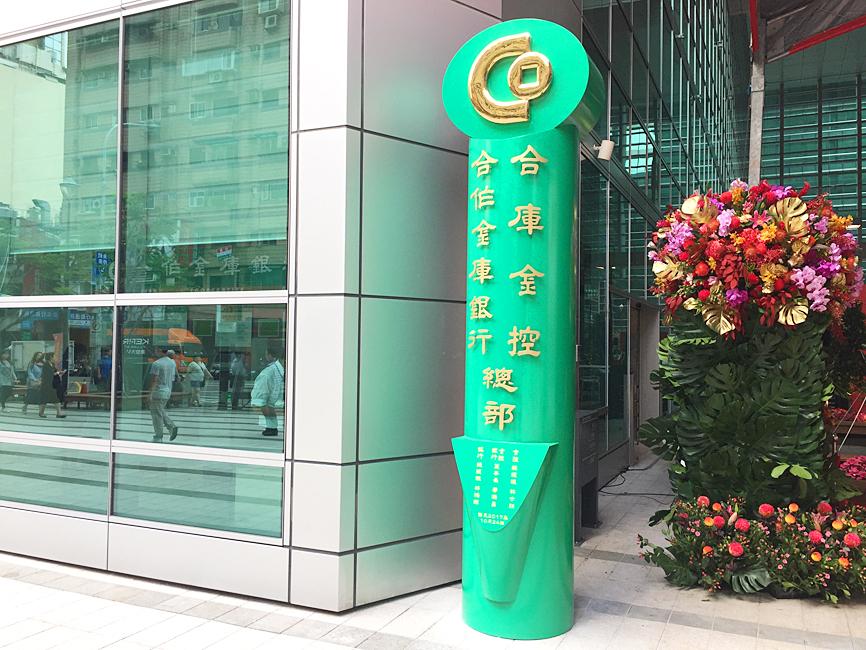Taiwan Cooperative Financial Holding Co (TCFH, 合庫金控) aims to improve its business next year in line with the nation’s economic growth, but uncertainty related to the COVID-19 pandemic lingers, top executives told an investors’ conference yesterday.
The guardedly positive view was shared after the state-run conglomerate reported NT$12.39 billion (US$429.75 million) in net income for the first three quarters — a 6.29 percent decline from the same period last year, as the low interest rate environment restricted its earnings ability, TCFH president Chen Mei-tsu (陳美足) said.
That translated into earnings per share of NT$0.9, down from NT$0.97 for the same period last year, company data showed.

Photo: Lu Kuan-cheng, Taipei Times
“We will take cues from the nation’s GDP growth next year in setting profitability goals,” Chen told an online conference call, adding that the Directorate-General of Budget, Accounting and Statistics in August forecast that Taiwan’s economy would grow 3.92 percent next year.
The company’s main subsidiary, Taiwan Cooperative Bank (合庫銀行), saw its net income shrink 10.09 percent year-on-year to NT$10.7 billion due to a drop in interest and fee incomes, as well as an increase in bad loans and provision costs, Chen said.
The interest spread for local and foreign currency loans narrowed to 1.282 percent at the end of September from 1.316 percent in June, TCFH’s report showed.
Net interest margin, a critical gauge for the banking industry, stood at 0.966 percent in September, compared with 0.993 percent three months earlier.
The lender attributed the retreat to interest rate cuts at home and abroad, as well as competition among its peers to woo customers.
Chen said net interest margin showed signs of stabilization last quarter, but added that it is too early to talk about a recovery.
TCFH said fee income dropped 1.44 percent from a year earlier, after its wealth management business tumbled 9.48 percent and credit card operations plunged 49.61 percent.
Sales of insurance policies took a hard hit from drastic interest cuts, while international travel restrictions significantly dampened interest in card spending abroad, it said.
The situation is unlikely to improve until the world returns to normal, TCFH said.
It said that it has room to grow its real-estate lending, which stands at 28.25 percent, lower than its peers, adding that it has leeway of NT$56 billion before it hits the 30 percent cap of total deposits and debts.
TCFH said it would seek to raise land and construction financing to NT$140 billion next year, from NT$125.6 billion as of September this year.
The current volume is 20 percent more than it was a year earlier, it said, adding that real-estate loans could increase 24 percent year-on-year if operations reach NT$130 billion at the end of this year as hoped for.

GROWING OWINGS: While Luxembourg and China swapped the top three spots, the US continued to be the largest exposure for Taiwan for the 41st consecutive quarter The US remained the largest debtor nation to Taiwan’s banking sector for the 41st consecutive quarter at the end of September, after local banks’ exposure to the US market rose more than 2 percent from three months earlier, the central bank said. Exposure to the US increased to US$198.896 billion, up US$4.026 billion, or 2.07 percent, from US$194.87 billion in the previous quarter, data released by the central bank showed on Friday. Of the increase, about US$1.4 billion came from banks’ investments in securitized products and interbank loans in the US, while another US$2.6 billion stemmed from trust assets, including mutual funds,

AI TALENT: No financial details were released about the deal, in which top Groq executives, including its CEO, would join Nvidia to help advance the technology Nvidia Corp has agreed to a licensing deal with artificial intelligence (AI) start-up Groq, furthering its investments in companies connected to the AI boom and gaining the right to add a new type of technology to its products. The world’s largest publicly traded company has paid for the right to use Groq’s technology and is to integrate its chip design into future products. Some of the start-up’s executives are leaving to join Nvidia to help with that effort, the companies said. Groq would continue as an independent company with a new chief executive, it said on Wednesday in a post on its Web

JOINT EFFORTS: MediaTek would partner with Denso to develop custom chips to support the car-part specialist company’s driver-assist systems in an expanding market MediaTek Inc (聯發科), the world’s largest mobile phone chip designer, yesterday said it is working closely with Japan’s Denso Corp to build a custom automotive system-on-chip (SoC) solution tailored for advanced driver-assistance systems and cockpit systems, adding another customer to its new application-specific IC (ASIC) business. This effort merges Denso’s automotive-grade safety expertise and deep vehicle integration with MediaTek’s technologies cultivated through the development of Media- Tek’s Dimensity AX, leveraging efficient, high-performance SoCs and artificial intelligence (AI) capabilities to offer a scalable, production-ready platform for next-generation driver assistance, the company said in a statement yesterday. “Through this collaboration, we are bringing two

Even as the US is embarked on a bitter rivalry with China over the deployment of artificial intelligence (AI), Chinese technology is quietly making inroads into the US market. Despite considerable geopolitical tensions, Chinese open-source AI models are winning over a growing number of programmers and companies in the US. These are different from the closed generative AI models that have become household names — ChatGPT-maker OpenAI or Google’s Gemini — whose inner workings are fiercely protected. In contrast, “open” models offered by many Chinese rivals, from Alibaba (阿里巴巴) to DeepSeek (深度求索), allow programmers to customize parts of the software to suit their